
In this issue of Clif’s Notes, I highlight the University’s achievement of its performance-based funding measures, provide information about the hiring of Coach Stec as our new head football coach, recap items discussed at the December Board of Governors meeting, summarize the CBHE’s coordinated planning process, and provide information about the University’s new weekly newsletter called Inside Missouri State.
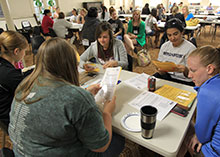 State performance measures
State performance measures
This is the third year of Missouri’s performance-based funding model. In the past two years, Missouri State met all five of its performance measures at both campuses. We recently received confirmation that we have once again met all five of our performance measures for fiscal year 2014 on the Springfield and West Plains campuses. This means that if the General Assembly funds the performance-based funding model during the upcoming legislative session, we will receive the maximum available increase to our operating appropriation
Meeting these performance measures requires everyone at the University to work hard and achieve positive results. Thanks to everyone who helped Missouri State realize this significant success.
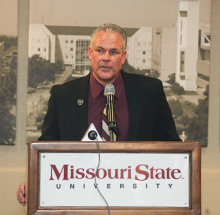 Head football coach
Head football coach
On Sunday, December 14, Missouri State hired Dave Steckel as its new head football coach. Coach Stec (he prefers to be called “Stec”) has spent the last 14 seasons with the University of Missouri, completing his tenure as associate head coach and defensive coordinator. He was the only defensive coach among the five finalists for the 2014 Frank Broyles Award as the nation’s top assistant coach.
We have a five-year agreement with Coach Stec with a base salary of $270,000. Though this salary is $120,000 higher than the prior head football coach’s salary, no new University funds will be committed to the athletics department for Coach Stec’s salary. Sixty thousand dollars will come from salary savings due to the elimination of a position in the athletics department through attrition. The other $60,000 will be raised through private contributions from donors. You can find more information about Coach Stec in the official press release.
This is an exciting time for Missouri State’s football program. Please join me in welcoming Coach Stec to our University.
Board of Governors actions
The Board met on Friday, December 12. I want to summarize four topics that were addressed at the meeting.
First, Governor Hoven, next year’s Board chair, announced his committee assignments for 2015. Governors Carmichael, Fry, Hofherr and Hoven (ex officio) will serve on the Executive Committee. Governors Hofherr (chair), Doyle, Miller and Seal will serve on the Programs and Planning Committee. Governors Fry (chair), Carmichael, Hoven, Kimbrough and Tergin will serve on the Finance and Facilities Committee.
Second, the Board discussed the University’s broadcast services. Tammy Wiley, general manager of KSMU and Ozarks Public Television (OPT), gave a multimedia presentation to the Board. I have received positive feedback about the presentation and about the important services KSMU and OPT provide to our region.
Third, the Board approved Faculty Senate’s nominations of Elise Crain and Tom Strong for honorary Doctor of Public Affairs degrees to be award at the May 15, 2015, commencement ceremonies. Ms. Crain and Mr. Strong have served as significant volunteer leaders to the Missouri State community and to our region. Ms. Crain’s passion for education and children provided the foundation for her work as one of the founders and volunteers for the Ozark Care to Learn program, providing new clothing, shoes, hygiene kits and access to medical care for children. Mr. Strong’s notable volunteer leadership at Missouri State has included serving as president of the Alumni Association, co-founder and charter member of the basketball booster club, member of the Board of Governors, and president of the Missouri State University Foundation. Ms. Crain and Mr. Strong are very deserving of this honor, and I want to personally congratulate them.
Finally, the Board passed resolutions honoring Governors Miller, Kimbrough and Tergin for their service to the University. The terms for these governors expire at the end of the year, but each of them will continue to serve on the Board of Governors until resignation or until the Governor nominates a replacement and the Senate confirms the nomination.
A few days after the Board meeting, on Tuesday, December 16, the United States Senate confirmed Governor Bough as a Federal District Court Judge for the Western District of Missouri. Accordingly, Governor Bough has resigned from the Board of Governors.
I want to say thank you to Governors Bough, Miller, Kimbrough and Tergin. I have enjoyed working with each of you and you will be greatly missed.
CBHE’s coordinated planning process
Missouri’s Coordinating Board for Higher Education (CBHE) recently began a process to develop a new coordinated plan for the state’s higher education system titled Preparing Missourians to Succeed: A Blueprint for Higher Education. CBHE anticipates that the plan will focus on accessibility, affordability, quality and completion with regard to the state’s higher education system.
To facilitate the planning process, CBHE has appointed a steering committee and scheduled hearings throughout the state to receive testimony from higher education leaders, employers, business leaders and others. Dr. David Russell, commissioner of higher education, has appointed me to the steering committee, and I will actively participate in the hearings. Missouri State will have an opportunity to testify as part of this process during a June 2015 hearing scheduled to take place in Springfield.
Please feel free to send any comments you have about this process to my office.
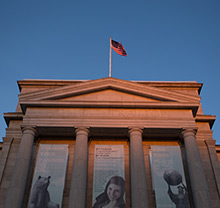 Inside Missouri State
Inside Missouri State
This will be the last issue of Clif’s Notes that you will receive directly from me. Beginning next semester, all faculty and staff will begin receiving a weekly employee newsletter called Inside Missouri State. The newsletter will come out on Tuesdays and is intended to replace most campus wide emails.
Inside Missouri State will become the primary means of communicating with employees on a University-wide level. It will incorporate regular communications that currently go out by individual offices, including:
- Clif’s Notes
- Provost Communiqué
- Diversity Perspectives Newsletter
- Employee Wellness Newsletter
- Human Resources announcements
Inside Missouri State will also include:
- Featured events
- Information on University benefits and perks
- Information about promotions, new hires, office name changes and retirement receptions
- News about faculty and staff accomplishments
- Featured blog posts
I hope you will take time each week to read Inside Missouri State. I also hope that you will help us reduce the number of campus wide emails by submitting items for campus distribution to University communications.
Information pertinent only to a certain college, department or division should continue to be sent by existing methods of communication. Notices that are required by law or policy to be sent to employees will continue to be sent by individual email.
Conclusion
I hope all of you have a good holiday break and come back to campus ready to accomplish big things in the spring semester. I plan to read; see the new movie “Unbroken,” which will be released on Christmas day; enjoy family and travel to Florida for a few days. I hope your days off are also filled with joy and happiness. Thanks for all you do for Missouri State University.
The Missouri State University Board of Governors designated six students as the 2014-15 Citizen Scholars at their meeting last week. These students were selected for their dedication to the public affairs mission of the University through course work, activities and service-learning opportunities.
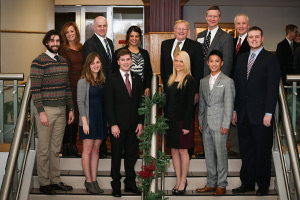
2014-15 Citizen Scholars
- Jared Bajkowski, a senior entrepreneurship major from Lee’s Summit, Missouri
- Brittany Donnellan, a senior international business major with a Spanish minor from Springfield, Missouri
- Jordan McGee, a senior economics and organizational communication major from Ellisville, Missouri
- Samantha Nichols, a senior religious studies major with an Ozarks studies minor from Stilwell, Kansas
- Konnor Temple, a senior international business major with minors in Mandarin Chinese and logistics and supply chain management from Springfield, Missouri
- Jared Cates, a graduate student in the student affairs in higher education master’s program from West Plains, Missouri
Each student received a crystal globe in recognition of the award, and their names have been added to the Citizen Scholar wall in Plaster Student Union.
Please join me in recognizing the accomplishments of these remarkable Missouri State students.

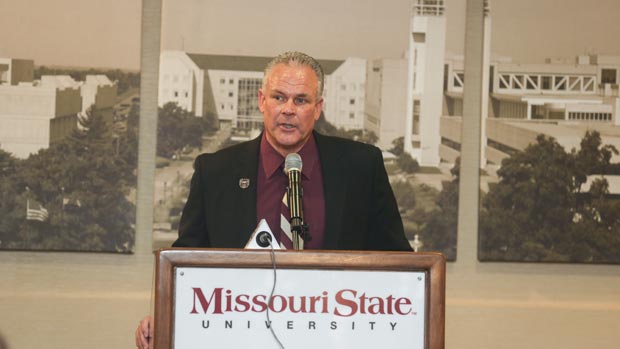
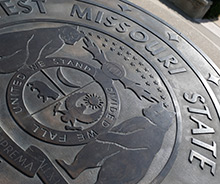
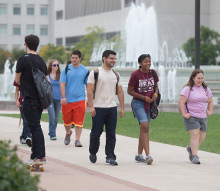
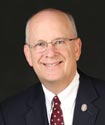
 Send comments
Send comments Follow Clif Smart on Twitter
Follow Clif Smart on Twitter
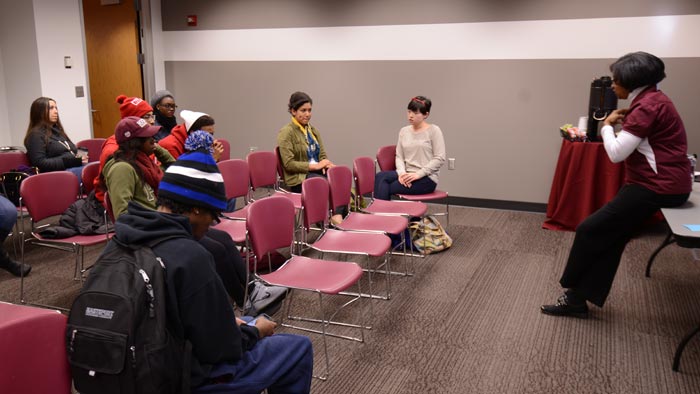
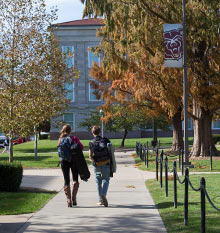 Missouri State Vision: Our Passion for Excellence
Missouri State Vision: Our Passion for Excellence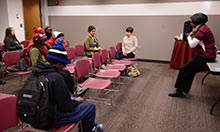 Ferguson dialogue
Ferguson dialogue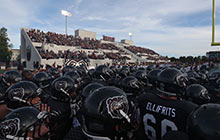 Head football coach
Head football coach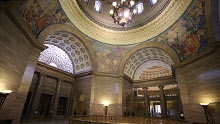 Legislative priorities
Legislative priorities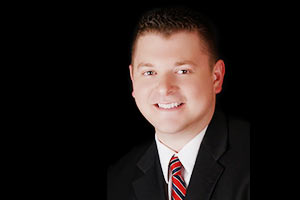
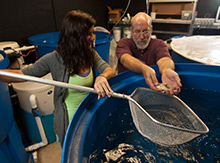
 Veto session
Veto session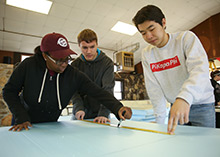 Center for Community Engagement
Center for Community Engagement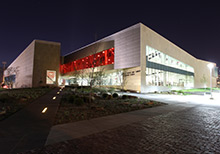 Green building leadership certification
Green building leadership certification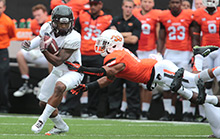 Family Weekend and first home football game
Family Weekend and first home football game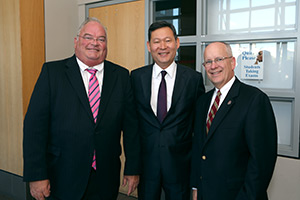 Early this semester, Missouri State welcomed His Excellency Kairat Umarov, the ambassador of Kazakhstan to campus. Congressman Billy Long was instrumental in arranging the visit. Our political science department also deserves recognition for helping host the event.
Early this semester, Missouri State welcomed His Excellency Kairat Umarov, the ambassador of Kazakhstan to campus. Congressman Billy Long was instrumental in arranging the visit. Our political science department also deserves recognition for helping host the event.